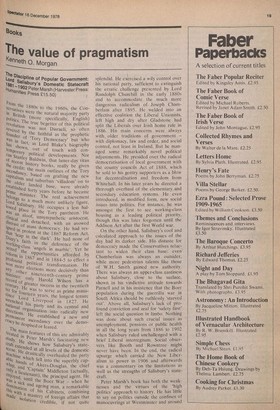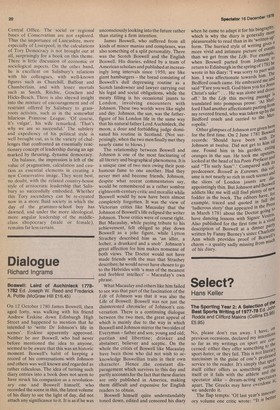The value of pragmatism
Kenneth 0. Morgan
The Discipline of Popular Government: lord Salisbury's Domestic Statecraft 11,81 -1 902 Peter Marsh (Harvester Press: -urnanities Press £15.50) From the 1880s to the 1960s, the Conservatives were the natural majority party in British (more specifically, English) Politics rev . The true begetter of this political olution was not Disraeli, so often revered by the faithful as the prophetic founder of was 'Tory Democracy' but Who in has fact, as Lord Blake's biography le shown, out of touch with conMPorary political developments. Nor can Stanley Baldwin, that latter-day titan of recent history books, really be given the credit: the main outlines of the 'Tory ascendancy, based on grafting the new th capitalism and suburban `villadom' on to e older estab' landed base, were already Pri landed forty years before he became k„,,tine minister. The real achievement "longs to a much more unlikely figure, Inwed rd SatisburY. He occupies a less hal place in the Tory pantheon. He cistrw,as an aloof, unsympathetic aristocrat, i inical and detached, with an avowed ust of igne mass democracy. He had restd in protest at the 1867 Reform Act, ur 1.1 .a t 'leap in the dark'. He had none of izzY's faith in the deference of the sei wo.rking-class 'angels in marble', yet he zed ' refo •the opportunities afforded by 13rm in 1867 and in 1884-5 to effect a r13found political transformation. He 7c'n more elections more decisively than inany other nineteenth-century lIntster: only Harold Wilson hparsimae cece'rd of greater success in the twentieth tenittrY. He was to serve as prime minisse.' for fourteen years, the longest tenure wince Lord Liverpool in 1827. He ,srenched his party and its central and "_,a,rhonal organisation into radically new dire a1 Perrnan Fie established a new and ern ascendancy over the democracY he despised or feared. The ireatedrnain features of this are admirably in Peter Marsh's fascinating new studY; He shows how Salisbury's state4s:t eXteeded at all levels of the domestic He drastically overhauled the party alu,achine which fell into the superbly capn IF hands of Akers-Douglas, the chief ow_11,11), and 'Captain' Middleton (actually, en'Y a lieutenant), the principal agent. He _r11°Yed, until the Boer War when he was a sick and ageing man, a remarkable utLo.rnination of his Cabinets, combining with a mastery of foreign affairs that isolation credible, if not quite splendid. He exercised a wily control over his national party, sufficient to extinguish the erratic challenge presented by Lord Randolph Churchill in the early 1880s and to accommodate the much more dangerous radicalism of Joseph Chamberlain after 1895. He welded into an effective coalition the Liberal Unionists, left high and dry after Gladstone had split the Liberals over Irish home rule in 1886. His main concerns were always with, older traditions of government with diplomacy, law and order, and social control, not least in Ireland. But he managed some remarkably novel political adjustments. He presided over the radical democratisation of local government with the county councils Act of 1888, which he sold to his gentry supporters as a blow for decentralisation and freedom from Whitehall. In his later years he directed a thorough overhaul of the elementary and secondary education systems. He even introduced, in modified form, new social issues into politics. For instance, he was amongst the first to see working-class housing as a leading political priority, though this was later forgotten until the Addison Act after the first World war.
On the other hand, Salisbury's cool and calculated approach to the issues of the day had its darker side. His distaste for democracy made the Conservatives reluctant to widen their class base: even Chamberlain was always an outsider, while more pedestrian talents like those of W.H. Smith gained new authority. There was always an upper-class nastiness about Salisbury, close to the surface, shown in his vindictive attitude towards Parnell and in his insistence that the Boer population during the guerrilla war in South Africa should be ruthlessly 'starved out'. Above all, Salisbury's lack of profound conviction and zeal for 'safety first' left the social question in limbo. Nothing was done about such crucial issues as unemployment, pensions or public health in all the long years from 1886 to 1902 when Salisbury ruled unchallenged with a brief Liberal interregnum. Social observers like Booth and Rowntree might never have been. In the end, the radical upsurge which carried the New Liberalism to power in 1906 and afterwards was a commentary on the limitations as well as the strengths of Salisbury's statecraft, Peter Marsh's book has both the weaknesses and the virtues of the 'high politics' approach to history. He has little to say on politics outside the confines of manoeuvrings at Westminster and around Central Office. The social or regional bases of Conservatism are not explored. Thus the importance of Lancashire, more especially of Liverpool, in the calculations of Tory Democracy is not brought out at all, surprisingly for a book on this theme. There is little discussion of economic or sociological aspects. On the other hand, he is excellent on Salisbury's relations with his colleagues, with well-known figures such as Churchill, Balfour and Chamberlain, and with lesser mortals such as Smith, Ritchie, Goschen and Hicks-Beach. There is also shrewd insight into the mixture of encouragement and of restraint offered by Salisbury to grassroots activists, such as in the somewhat hilarious Primrose League. 'Of course, it's vulgar', his wife remarked. 'That's why we are so successful.' The subtlety and expediency of his political style is well brought out, as is the variety of challenges that confronted an essentially reactionary concept of leadership during an age marked by thrusting, dynamic democracy.
On balance, the impression is left of the value of pragmatism, calculation and caution as essential elements in creating a new Conservative image. They went best, no doubt, with the relaxed country-house style of aristocratic leadership that Salisbury so successfully embodied. Whether this Tory ascendancy can be re-created now in a more fluid society in which the day of the grarnmer-school boy has dawned, and under the more ideological, more angular leadership of the middleclass shopocracy (male or female), remains far less certain.



































 Previous page
Previous page